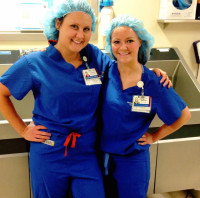Cardiovascular technologists work closely with physicians in a medical setting such as a hospital or doctor’s office. They perform or assist with procedures such as electrocardiograms or ultrasounds of the heart.
Numerous schools offer Associate level degrees for cardiovascular technologists, which is the most common level of education required for this profession. Some educational institutions are starting to offer Bachelor degree programs for those who wish to further specialize in a particular area, such as invasive cardiovascular technology, or who want the chance to complete longer clinical placement periods.
How do you Become a Cardiovascular Technologist?
-
- Choose the right program. Research schools in your area, and ensure that you meet their prerequisites. Fill in any educational gaps before applying. Apply to a school that has program-level accreditation, preferably from the Commission on Accreditation of Allied Health Education Programs (CAAHEP).
- Get your degree. You must have at least an Associate of Science degree in cardiovascular technology. Some schools offer Bachelor’s degrees or add-on specialties.
- Receive your credentials. Employers will likely require you to have your credentials from the ARDMS or CCI. This certification is also required by some states in order to practice as a cardiovascular tech.
How Much do Cardiovascular Techs Earn?
The table below shows the national median salary for cardiovascular techs for those across the earning spectrum. Conditions in your area may vary.
Lowest 10% Median Top 10% $33,950 $63,020 $102,000 (Bureau of Labor Statistics, National Occupational Employment Statistics Survey, May 2022)
What do Cardiovascular Techs Do?
 Cardiovascular technologists or technicians assist physicians in diagnosing and treating problems associated with the cardiovascular system (the heart and peripheral blood vessels throughout the whole body). Their job may include invasive duties (such as inserting a catheter through a patient’s artery) or non-invasive duties, such as performing an ultrasound on the heart (echocardiogram).
Cardiovascular technologists or technicians assist physicians in diagnosing and treating problems associated with the cardiovascular system (the heart and peripheral blood vessels throughout the whole body). Their job may include invasive duties (such as inserting a catheter through a patient’s artery) or non-invasive duties, such as performing an ultrasound on the heart (echocardiogram).- Cardiology Technologists: Cardiology technologists assist doctors in diagnosing and treating heart problems and ailments. They perform cardiac catheterizations (including balloon angioplasties), monitor blood pressure and heart rate, prepare and monitor patients for procedures, such as heart surgery or the insertion of stents and pacemakers, and conduct EKGs (electrocardiograms). They may also conduct an ultrasound on the heart (echocardiograms or ECHOs).
- Vascular Technologists: Vascular technologists are a part of the healthcare team that diagnoses diseases and problems associated with the vascular (blood vessel) system. Vascular sonographers perform ultrasounds on patients to monitor blood pressure, blood flow and the blood’s oxygen saturation. These procedures often take place during or right after surgery.
- Cardiac Sonographers: Cardiac sonographers perform echocardiograms, also referred to as ECHOs, which involves performing ultrasounds on the components of the heart. Echocardiograms may be conducted on both active and inactive patients.

Ask an Expert
Jessica Carlino, RDCS, graduate of Pennsylvania College of Health Sciences, lends us her expertise.
Question
What traits make someone a successful student?
Answer
Successful sonography students should have a strong work ethic and understand how to communicate with others. Sonography is a challenging program, and is a constantly changing profession. Hard work is a trait that both students and professionals need to possess to be successful. Also, sonography is a profession that will be strongly dependent on communication.
Sonographers need to have the ability to thoroughly communicate with patients, physicians, co-workers, and managers. Sonography is a user-dependent test modality, so the outcome of the study is based on the willingness and discipline of the sonographer.
Job Requirements and Working Environment
The vast majority of cardiovascular technicians and technologists work for medical and/or surgical hospitals. Others work for medical/diagnostic laboratories, doctor’s offices, hospitals, physician’s offices, and outpatient healthcare facilities. They may be required to work evenings and weekends in emergency situations.
In a hospital environment, cardiovascular technologists are on their feet for most of their work day and are often on the move assisting patients, doctors, and surgeons that require their services. However, in some cases, patients will come to the technologist’s department if they have an appointment to have an ECHO done, for example.
Typical duties for a cardiovascular tech:
- Preparing patients for procedures and answering any questions they may have.
- Performing cardiac or vascular ultrasounds and analyzing the recorded images.
- Assisting physicians/surgeons with procedures including surgeries, cardiac catheterizations, angioplasties, and more.
- Monitoring the vitals of patients who have recently undergone a procedure.
- Maintaining all cardiovascular equipment.
- Conducting stress tests or other EKG procedures.
- Sharing results from any tests with physicians and other members of the healthcare team.
- Recording results and updating patient records.

A cardiac ultrasound performed in space!
Receiving Your Credentials
Although not all states require certification, most hospitals and healthcare facilities will only hire cardiovascular technologists who are accredited. Certification from the ARDMS (The American Registry for Diagnostic Medical Sonography) is widely respected and accepted by the medical community within the United States and abroad. You can also sit for the RDCS exam to become a Registered Diagnostic Cardiac Sonographer.
To be eligible to sit for the exam, you must have completed a two-year allied health educational program and completed a year of related experience or graduated with an accredited educational program specifically related, such as a Certificate in Cardiovascular Technology. If you want your job description to go beyond ultrasonography, you may wish to investigate certification through CCI (Cardiovascular Credentialing International).
Cardiovascular Credentialing International - Certified Cardiographic Technician (CCT)
- Registered Cardiac Sonographer (RCS)
- Registered Vascular Specialist (RVS)
- Registered Cardiovascular Invasive Specialist (RCIS)
ARDMS - Registered Cardiac Sonographer (RCS)
- Registered Vascular Technologist (RVT)
Are There Any Online Programs?
You typically won’t be able to find an Associates Degree in Cardiovascular Technology offered online, since a lot of the coursework includes hands-on work in laboratories and during clinical rotations. However, if you already have clinical experience and are pursuing a Bachelors completion program, some cardiovascular technologist schools will offer all or some of the courses online.
Simulation training, such as the program highlighted in our interview with the Program Chair of Diagnostic Medical Sonography at Pennsylvania College of Health Sciences, is a great example of why an online degree isn’t always the best option.If you are already a practicing cardiovascular technologist and are seeking professional development or CME (continuing medical education) credits, numerous organizations, such as the American Society of Echocardiography or the Society of Diagnostic Medical Sonography, will offer online courses.
Courses
Cardiovascular technologist courses include:
- Anatomy and physiology
- Pathology
- Echocardiography (cardiac ultrasound)
- Electrocardiography
- Invasive cardiovascular procedures
- Clinical cardiovascular laboratory

